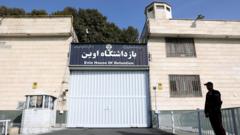Despite President Trump’s announcement of a cease-fire between Israel and Iran, hostilities continue with ongoing missile strikes. The situation remains fluid as more information emerges.
Cease-Fire Claimed Between Iran and Israel Amid Ongoing Strikes

Cease-Fire Claimed Between Iran and Israel Amid Ongoing Strikes
President Trump announces a cease-fire agreement that remains uncertain as conflict continues.
The conflict between Iran and Israel has reached a precarious moment as President Trump announced a cease-fire agreement which Iran’s foreign minister has acknowledged, albeit with uncertainties persist. While Trump claimed that both nations had come to an understanding, missile exchanges were still being reported, indicating that fighting had not fully ceased.
Hours after Trump’s social media post declaring a complete and total cease-fire, Iranian officials confirmed that military operations would halt only if Israel ceased its airstrikes by 4 a.m. Tehran time. Iran's foreign minister, Abbas Araghchi, indicated that fighting extended until the appointed time, reflecting the tense atmosphere leading up to the cease-fire.
The backdrop to these developments involves a series of intense missile strikes last week, with Iran launching rockets at the Al Udeid Air Base in Qatar, the largest U.S. military installation in the region, in retaliation for American strikes on its nuclear facilities. Interestingly, U.S. officials reported that the majority of Iranian missiles had been intercepted and caused little damage or casualties among the 10,000 stationed troops.
In the hours leading to the cease-fire announcement, Israel continued its air raids on Iranian targets, including structures supporting the Islamic Revolutionary Guards Corps. The Israeli military's hesitance to confirm the cease-fire has left the situation unclear. Trump suggested that military missions would “wind down” gradually and emphasized that the cease-fire would unfold in phases, highlighting the complexity of negotiations.
Diplomatic efforts, aided by Qatari officials, played a significant role in brokering this cease-fire, introducing a glimmer of hope for de-escalation. However, ongoing missile launches from Iran and rapid airstrikes from Israel raise questions about the sustainability of peace. Meanwhile, Vice President JD Vance noted that the opportunity for a genuine peace process lies ahead, though still overshadowed by the possibility of renewed military actions.
As this geopolitical drama unfolds, analysts are keeping a close watch on its impact on global oil markets and the broader implications for regional stability. With oil prices responding to these hostilities, the eyes of the international community are firmly fixed on the developments emerging from this fraught cease-fire announcement. As uncertainty lingers, concerns over potential retaliation and escalation remain paramount in the minds of strategic observers.
Hours after Trump’s social media post declaring a complete and total cease-fire, Iranian officials confirmed that military operations would halt only if Israel ceased its airstrikes by 4 a.m. Tehran time. Iran's foreign minister, Abbas Araghchi, indicated that fighting extended until the appointed time, reflecting the tense atmosphere leading up to the cease-fire.
The backdrop to these developments involves a series of intense missile strikes last week, with Iran launching rockets at the Al Udeid Air Base in Qatar, the largest U.S. military installation in the region, in retaliation for American strikes on its nuclear facilities. Interestingly, U.S. officials reported that the majority of Iranian missiles had been intercepted and caused little damage or casualties among the 10,000 stationed troops.
In the hours leading to the cease-fire announcement, Israel continued its air raids on Iranian targets, including structures supporting the Islamic Revolutionary Guards Corps. The Israeli military's hesitance to confirm the cease-fire has left the situation unclear. Trump suggested that military missions would “wind down” gradually and emphasized that the cease-fire would unfold in phases, highlighting the complexity of negotiations.
Diplomatic efforts, aided by Qatari officials, played a significant role in brokering this cease-fire, introducing a glimmer of hope for de-escalation. However, ongoing missile launches from Iran and rapid airstrikes from Israel raise questions about the sustainability of peace. Meanwhile, Vice President JD Vance noted that the opportunity for a genuine peace process lies ahead, though still overshadowed by the possibility of renewed military actions.
As this geopolitical drama unfolds, analysts are keeping a close watch on its impact on global oil markets and the broader implications for regional stability. With oil prices responding to these hostilities, the eyes of the international community are firmly fixed on the developments emerging from this fraught cease-fire announcement. As uncertainty lingers, concerns over potential retaliation and escalation remain paramount in the minds of strategic observers.





















